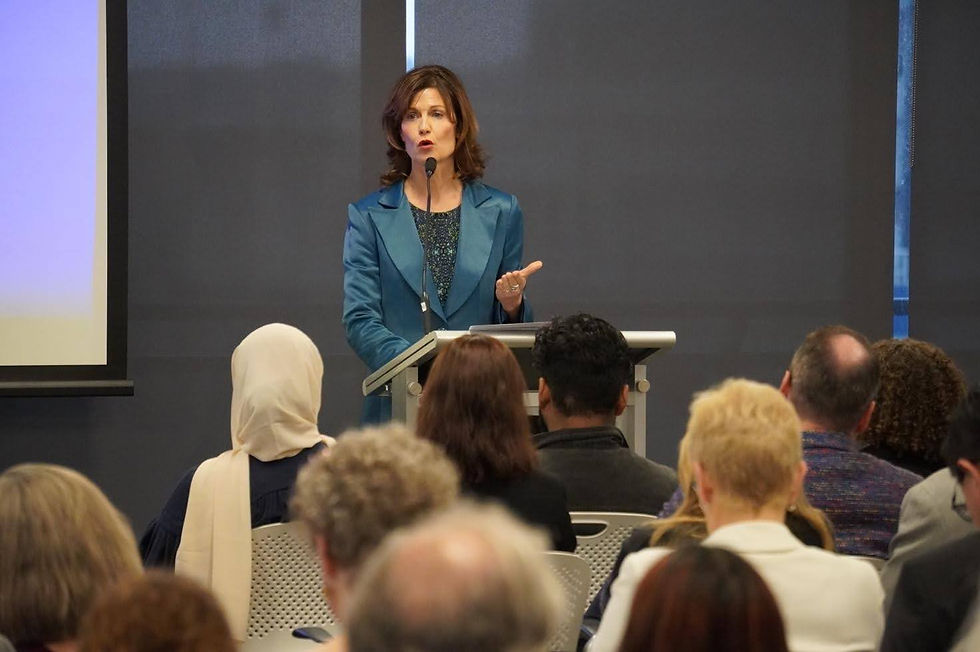Why a tiny microbe prompted a professor to speak publicly about her work – and why you should too
- Theresa Miller
- Jul 24, 2025
- 3 min read
If you’re lucky enough to be passionate about your work or cause, why not simply keep your head down and get on with it? Why get up on a soapbox and crow about it? Isn't that a little egotistical? Surely, your work should speak for itself.

The era of the 'Quiet Australian' has passed us by, and now we need to broadcast our message for several good reasons.
Firstly, you may want to share your expertise with a wider audience to inform and educate them and secondly, you may need to debunk myths and rumours.
There are, unfortunately, a lot of ill-informed commentators and influencers spruiking their opinions with very little knowledge to back up their claims. You have an opportunity, as a subject matter expert, to combat that misinformation.
Another good reason to speak up about your work is to draw attention to an important issue and attract the funding or investment to make a difference.
Speaking up about your work just might help save the planet.
Professor Belinda Ferrari from the UNSW School of Biomolecular Science and her team have analysed and tested a rare bacterium that lives in extreme cold on virtually thin air – hydrogen to be precise. The scientists hope the microbes might one day, help extract greenhouse gases from the atmosphere while revealing the effects of climate change on the polar region.
In 2019, she and her team went to Casey Station in Eastern Antarctica to check on the health of the bacteria communities. Sadly, climate change had taken its toll and their numbers had declined drastically.
Ferrari’s team would like to return to Antarctica to test their hypotheses about why this is happening, but research trips to the south pole don’t come cheaply and there’s stiff competition for places on the Australian Antarctica Research Station.
Professor Ferrari has missed out on several rounds of funding grants to scientists with higher profiles. Consequently, Ferrari is stepping up to speak on panels, present at conferences and talk to the media about the significance of their work.
'Antarctica is warming at an alarming rate, and most conservation strategies don’t include microbes. These organisms are vital to the carbon cycle and are the building blocks of life. We can't afford to lose them,' Belinda Ferrari said. 'Even though they're very small, they carry out important functions for the health of the planet.'
You too may feel small and sometimes invisible but unlike those microbes, you can’t live on thin air. If you believe your cause is significant, speak up at work, about your work.
Speaking publicly can help raise your visibility and career profile.
It's an opportunity to influence policy-makers, inspire the next generation and celebrate your hard work and success.
This can be used as leverage when you apply for a promotion.

Seize any chance to speak on a panel or at an industry function to appeal to would-be investors to expand your startup, donate to your charity or fund your research.
It might not happen immediately, but the more a key decision-maker hears your name mentioned in the right circles, the more likely you’ll be considered as a contender for a grant, funding or investment.
Invest in your professional and personal development. Book media and/or presentation skills training now.
(This is an extract from Theresa Miller’s book Speaking Up to be published by NewSouth Books in February 2026.)
Enrol in in the TM media and presentation skills online course - on sale now for $495

Want to refresh your media and presentation skills, or introduce a colleague to these techniques?
TM MEDIA's new online course features all the tools, tips and structures of my face-to-face workshop plus a one-hour zoom call with me to practice your interview skills and receive one-on-one feedback.




Comments